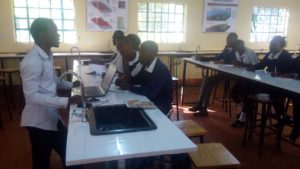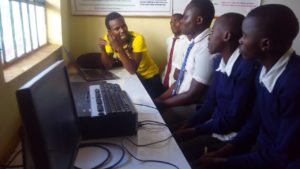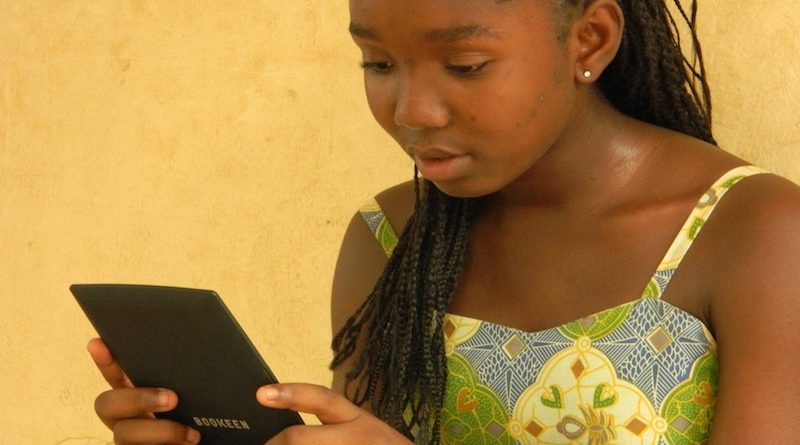Almost 80 per cent of Kenyan population comprises of youth. A fairly large number of these are teens who have extraordinary potential, yet lacking platforms to develop and honing their capabilities. Aiming to help raise a generation of youth fully aware of challenges affecting their communities, TAP Africa is a teens-focused initiative that enables the youth to create sustainable solutions and transform the country.
With successful projects like the recently concluded Teens Weave Stars to End Violence, Teens Voices Against Violence, and activities like Life-skills training and Mentorship forums, the initiative has so far directly engaged 30 volunteer-facilitators and over 3000 young people in addressing pressing social issues in their communities. This has been possible with collaboration from various grassroots organizations, schools, churches, and as well as some global programs.
Youth Unemployment Issue in Kenya:
About 80 per cent of Kenya’s entire 49 million population is below 35 years. According to a 2016 report by the Aga Khan University, over 55 per cent of these are unemployed, 62 per cent of them being women, and 68 per cent are those female residing in rural areas. Youth aged 18-25 years were twice more likely to be unemployed compared to their counterparts aged 26-35years. Further, according to 2011 World Bank and Kenya Government’s reports, 800,000 job-seekers enter the job market each year, yet only 50, 000 (6.25 per cent) find employment in the private sector. Therefore, Youth Unemployment has become a chronic headache to stakeholders in the country, each one trying to find a solution. It is also safe to say youth unemployment is a key hindrance to development
Personal Experiences and Perspectives on Youth Unemployment in Kenya:
Antony Ngatia, a volunteer with TAP Africa and Kenyan youth, is not pleased with the current status of youth unemployment, he says, ‘I am actually frustrated by the issue of unemployment in Kenya, I graduated two years ago with a Bachelors’ Degree in Political Science, second class upper honors division, from one of Kenya’s Top Universities. After investing over 16 years in acquiring education, I had great expectations of securing a job, to earn a living and support myself and my family. They also had great expectations. It’s so unfortunate that the leaders are actually doing nothing rather embezzling public funds in the name of development. The slogan ‘Najivunia kuwa Mkenya’. ’Am proud to be a Kenyan’, remains irrelevant to me as long as employment remains out of reach.’
Lucky Mwachi says ‘when I graduated three years ago, my biggest fear was staying unemployed for quite a while due to the shocking rates of unemployment in the country. At that moment, most of my friends who had graduated years before were still unemployed and this dampened my hopes even more. However, it also motivated me to work on not being part of this statistic by not focusing so much on looking for a paying job but rather gaining experience. I started my career by taking up a one year volunteering job at a local nonprofit which did help me gain so much experience, network and lay a foundation for my current and future jobs. From my experience, I encourage fellow youth to consider taking up volunteer opportunities/jobs’
Leslie Rono brings in new perspective to the issue of youth unemployment in Kenya based on her own experience. She says, ‘I have realized Kenya’s employers prefer diploma holders, due to their technical skills at the expense of degree holders. Massive corruption and tribalism in the national and county governments have also played a major role to youth unemployment in our country’.
Mr. Geoffrey Nyoro, a Human Resources Manager at Rentokil Initial opines, ‘It is important for youths to acquire soft skills like; communication skills, team leading skills, presentation and resume presentation.’ He further says, ‘I believe the quality of a diploma is higher compared to a degree; this is because it is compulsory for a diploma student to do an internship/apprenticeship program, which gives them hands-on experience on the job market. On the other hand, it is not Universities do not make it compulsory for a Degree students to enroll in Internship and Apprenticeship programs.’
Mr. Godrick Itur, a Human Resource Manager at Naivas Limited, a retail chain that hires young people brings in an interesting perspective. He says, ‘Having young people at our industry, a major issue that we are dealing with, is how to manage and understand this generation in terms of dress code, hair style and working hours.’
Gladys Muthara, TAP Africa Founder and Volunteer says, ‘Youth Unemployment problem in Kenya is real. So real that if you walk in the streets of Nairobi, every Monday to Friday, you’ll find hundreds of Kenyan Youth sitting in “Jobless Corners” desperation written all over their faces, while holding onto brown envelopes containing their resumes and education papers. It is so real that, every youth who surrounds me and is 28 years and below, is unemployed! Majority of them, brilliant young Kenyans who graduated from the University with amazing papers, but 3+ years down the line, they are still searching for jobs. In fact, those around me have stopped searching for jobs, and have instead decided to start their own ventures or seek casual jobs where they are exploited and underpaid…their hope, that one day they shall get employment or at least be part of the solution. Others, are opting to go back to school and study new courses, especially Masters programs with the hope that they shall secure employment!
Why TEEP Project:
 After researching about the youth unemployment issue in Kenya and having gone through Kenya’s Education System, we believe that the issue is a systemic one, and would only be sustainably addressed if we sort out the various key systems at play. The first and key contributor to this crisis is our Education System, which puts emphasis on passing in theoretical subjects rather than acquisition of skills, in primary, secondary, and tertiary institutions.
After researching about the youth unemployment issue in Kenya and having gone through Kenya’s Education System, we believe that the issue is a systemic one, and would only be sustainably addressed if we sort out the various key systems at play. The first and key contributor to this crisis is our Education System, which puts emphasis on passing in theoretical subjects rather than acquisition of skills, in primary, secondary, and tertiary institutions.
Gladys Muthara, says, ‘I studied Computer and Agricultural courses in high school, but only did two practical activities which were for exam purposes only. Therefore, I graduated from high school, at 18 years, and I did not even know how to switch on a computer! Luckily, my sister later enrolled me in a Digital Skills program after graduating from high school. But how many parents can afford to enroll their children in such programs to gain such valuable skills, which could chart a new path to self-employment after high school?”
Thousands of youths, especially, in the rural areas cannot afford to pay for digital classes, thereby leaving many digitally illiterate despite the surge in demand for Digital Services across the country. Youth’s chances to join Tertiary education in rural areas also decrease due to lack of information, which is otherwise readily available online.
 While the Digital Technology space in Kenya has massively grown, there is a huge un-met demand for basic digital services, especially in rural towns largely owing to inadequate digital skills among the young generation. A lot of other opportunities for jobs and learning e.g. Online Jobs, Online courses, also exist online, yet most young people are not able to access them due to inadequate digital and internet skills. The Agriculture sector is also largely a no-go-zone area for the youth, with only 11% Kenyan youth being interested in Farming. For many a youth, it is a dirty job for the poor in rural areas, despite the fact the country keeps on experiencing food shortages. Agriculture has been left to the elderly and weak in rural areas, who use traditional farming methods, and mainly focus on subsistence farming. In fact, it is rarely viewed by many as a source of employment.
While the Digital Technology space in Kenya has massively grown, there is a huge un-met demand for basic digital services, especially in rural towns largely owing to inadequate digital skills among the young generation. A lot of other opportunities for jobs and learning e.g. Online Jobs, Online courses, also exist online, yet most young people are not able to access them due to inadequate digital and internet skills. The Agriculture sector is also largely a no-go-zone area for the youth, with only 11% Kenyan youth being interested in Farming. For many a youth, it is a dirty job for the poor in rural areas, despite the fact the country keeps on experiencing food shortages. Agriculture has been left to the elderly and weak in rural areas, who use traditional farming methods, and mainly focus on subsistence farming. In fact, it is rarely viewed by many as a source of employment.
How:
Therefore, with these factors in mind, we developed Teens for Employability and Entrepreneurship project (TEEP) that seeks to address the alarming youth unemployment in Kenya by engaging young people (girls and boys, 15-19 years) in rural areas to acquire high-on-demand technical skills in Digital technology and Agribusiness sectors, as well as complementary employability and entrepreneurship skills.
The TEEP Project comprises of an After-School Program, girls and boys, of high school level in rural areas are equipped with Digital Skills and Agribusiness skills, through school-based and community based learning workshops and activities. The After-School Program is implemented in 2 Phases. Graduating youth of the After-School Program then join TAP Africa Digital Centers and selected Agribusiness Centers/Farms, for the On-the-Job Learning Program. Here, they not only polish up their technical skills but also acquire important employability and entrepreneurship skills. The program will also offer additional workshops on skills such as Financial Literacy, Customer Service, Marketing, Resume writing and Interviewing processes among others.
TAP Africa aims to start its own Digital Centers which will act as the youths first point of employment. Here, the youth will offer a wide range of Digital Services to the public like, Graphics Designing & Printing, Website Designing, General Photocopying, Typing, and Printing services, Paid Computer Lessons to youth in the communities, and Online Jobs, while gaining access to Digital Libraries, Online Courses, as well as other opportunities. The Digital Centers will also act as income-generating businesses, from where, we shall fund subsequent After-school Program activities, Complementary Workshops, pay stipends to the youth and cater for Administration costs. With successful implementation of the above activities at the Centers, we project that a center shall make $1000-1500 per month.
Progress:
Currently, the Phase 1 Pilot of the project underway at Hon. Kiragu Secondary School, in Kirinyaga county. Six girls and six boys (15-19 years) are being trained on Computer Skills for the very First time in their lives! All of them are touching a computer, and switching it on for the very first time. Despite the fact that it seems like an uphill task for us, it is very exciting to see them very enthusiastic to learn. For them, it is a rare privilege that they are enrolled in this program to learn computer skills for Free! This has left over 400 other young people feeling left behind, because they know for sure that they might never be able to afford enrolling themselves in a similar program after school. This definitely breaks our hearts as trainers because we would so much love to have all students on board. To signify just how important this program is to them, the 12 students always sit in class 15 minutes, despite the fact that they have to share a computer among 2-3 students. To them, this is a rare opportunity that must be grabbed with both hands!
The school’s Principal, Mr. Mwaniki is also pleasantly happy that his school is benefiting from the program. Despite various hiccups, like not being in a position to provide enough computers for use by the young people, he is very optimistic that this is but the beginning of a great opportunity for his students; one that will enable them to chart new career paths for themselves as early as 15 years, without resigning to the villages due to unemployment frustration. Knowing very well how important and worthwhile this program is, Mr. Mwaniki has bought 3 new computers for use by the students. In addition, the school has repaired 2 old computers, owned by the school, making it a total of 5 computers. Our Trainers also have 2 laptops, which are used during training, but cannot be left with students for further practice. Mr. Mwaniki, believes this is a journey of a thousand miles, and that, although only 12 students have been enrolled so far, due to lack of resources, more will benefit from the program in the long-term.
Conclusion:
Indeed, it is a journey of a thousand miles, even for us at TAP Africa, but one which we believe, with persistence and your kind support, shall lead us to unlocking new doors for thousands of youth in Rural areas of Kenya, who would otherwise end up frustrated, in villages, drowning their frustrations in cheap liquor, stealing, and selling their only pieces of land to bribe for jobs! And while at it, cursing education as a useless pursuit where one invests time and energy only to end up with nothing except papers that rot in brown envelops!
Article by Fridah Ndoro, TEEP Project Manager,
The TEEP Project was a brainchild of Fridah and co-designed with Gladys Muthara,
Fridah has a wealth of experience conducting research on Youth Unemployment in Kenya,
She aims to become a Governments’ Advisor on Youth Economic Empowerment in Africa, in Future.
Currently, TAP Africa, has been selected for The Spindle Public Award under The Best Innovation Category: TEENS FOR EMPLOYABILITY AND ENTREPENEURSHIP PROJECT (TEEP)
Ananke urges its readers to support TAP AFRICA and help empower the Kenyan youth and for the greater good of the community.
EVERY VOTE COUNTS: Below is what you can go.
Step1: Read About TEEP:
Step 2: Vote:
Step 3: Share!
HELP US SPREAD THE WORD!!
OR
HELP TEEP by Donating:
Needs:
10 Laptops for the After-School Program
20 Computers & Accessories for the On-the-Job Learning Program
30 Chairs and Tables for the Digital Center
A Printer/Photocopier/ & Scanner
A generator (For Power Backup at the Digital Center)
Internet
Projected Impact:
Direct Beneficiaries;
First 2 years: 100 teens, 2 schools; one county; 2 Digital centers; 2 school-based farms
First 5 years: 500 teens; 10 schools; one county; 5 Digital centers; 10 school-based farms
Other Beneficiaries;
Workshops; 5000 teens in 5 years; 50% Girls, 50% Boys
Teens Camps; 2000 teens in 5 years; 10 camps; 50% Girls, 50% Boys
Indirect Beneficiaries;
People that the direct beneficiaries interact with, inspire and influence, as well as teach some of the newly acquired skills
First 2 years; 2000 youth & adults
First 5 years; 5000-10000 youth & adults











